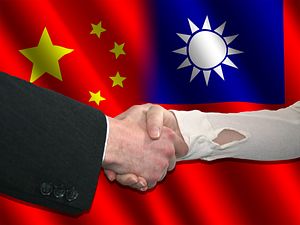As J. Michael Cole reported from Taipei, thousands of Taiwanese protestors have occupied the Legislative Yuan to demand reconsideration of a new trade agreement with mainland China. Over the weekend, a group of protestors occupied the Executive Yuan and were driven out by riot police. The protests in the Legislative Yuan, however, are still going strong.
After remaining largely silent about the protests, a Chinese official has finally commented (albeit indirectly) on the situation. Ma Xiaoguang, spokesman for China’s Taiwan Affairs Office, told reporters that the proposed Cross Strait Service Trade Agreement would be “mutually beneficial” for both Taiwan and the People’s Republic of China (PRC). Ma tried to defend the controversial agreement against accusations from Taiwanese opponents that it will decimate Taiwan’s economy by forcing small and medium businesses to close. Ma emphasized that the agreement will benefit people on both sides of the Taiwan Strait.
Ma also rebutted claims that the agreement will allow a flood of mainland Chinese workers into Taiwan, or that it will allow Chinese businessmen to effectively buy Taiwanese residency by investing a certain amount of capital in Taiwan. “I heard rumors that by investing 48,000 yuan ($7,730), mainland people could move to Taiwan, and I wonder how that could be possible,” Ma said.
Meanwhile, public opinion in China also seems to be against the protestors. Chinese netizens expressed shock and dismay at what was seen as excessive destruction by the protestors, which was viewed as evidence of a mob-like mentality. According to South China Morning Post, in an online poll by Sina Weibo, 60 percent of netizens said that the protest was “too irrational and populist.” Others said the protest was “typical of Taiwan’s often ill-tempered democracy”—not exactly a ringing endorsement of the protestors. Other netizens compared the protestors to “Red Guards,” the ultra-Maoist groups of students who terrorized China during the Cultural Revolution.
Bewilderment in China over the protests is exacerbated by the fact that many Chinese believe the CSSTA is actually unfairly balanced in Taiwan’s favor. The pact famously promises to open 80 service sectors in the PRC to Taiwanese investment, while only opening 64 for mainland Chinese investment in Taiwan. Some netizens said that China should back out of the pact, rather than having Beijing make concessions to Taipei only to receive anger in return.
China’s government may be thinking the same thing. Both Hu Jintao and current Chinese President Xi Jinping have adopted a strategy of peaceful negotiations with Taiwan, ever since current President Ma Ying-jeou came to power promising to improve cross-strait relations. Taiwan-China relations have blossomed ever since, with ever-closer economic ties. Now it seems Taiwan and China are on the cusp of moving into political talks. Last month saw an historic high-level meeting between the heads of the Taiwan Affairs Office and the Mainland Affairs Council, and people on both sides of the strait are wondering if a meeting between Ma and Xi is on the horizon.
However, the fierce protests over the CSSTA have the potential to bring this era of progress to a screeching halt. First, the protests are an undeniable sign of Taiwanese uneasiness with closer relations to the mainland. Even if the CSSTA itself eventually passes through Taiwan’s legislature, future agreements (whether economic or political) will be increasingly difficult. As a result, even if Ma Ying-jeou is willing to ignore plummeting approval ratings in order to continue advancing cross-strait ties, eventually he may find it impossible to push through such measures.
Beijing is watching closely now to see if Ma will be able to make good on the CSSTA, which was finalized between the Association for Relations Across the Taiwan Straits and the Straits Exchange Foundation. For the PRC, the CSSTA should have been a done deal. Now, the protestors are trying to force at least a clause-by-clause reconsideration of each proposal (effectively negating the negotiations already done between ARATS and the SEF)—and are hoping for the entire agreement to be scrapped. If public opposition in Taiwan can overrule agreements negotiated between the governments in Beijing and Taipei, then Beijing will rapidly lose its desire to negotiate.
In a larger sense, it’s important to remember that Beijing’s ultimate goal always has been reunification. Completely aside from any economic benefits, each move China makes in cross-strait relations is designed to bring the PRC closer to realizing direct political control over Taiwan. Whether one believes the Communist Party of China is seeking this goal simply by boosting its image (“winning the hearts and minds” of Taiwan’s people) or by the more nefarious (and direct) means of seeking to subvert Taiwan’s economic and political system, the CPC’s end goal is undeniable. The current protests indicate that the existing strategy of incremental increases in economic and cultural ties may have run its course. If so, Beijing will start to consider alternative options for achieving reunification.
































